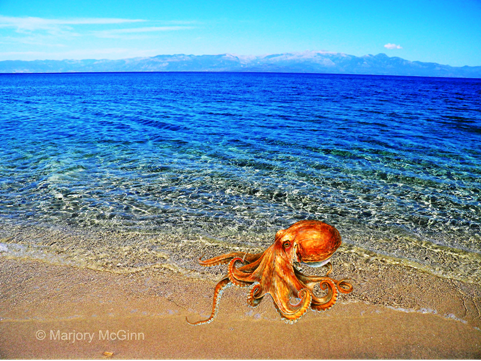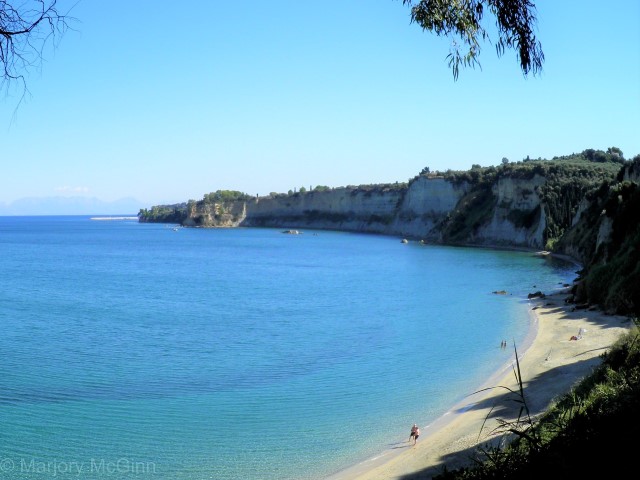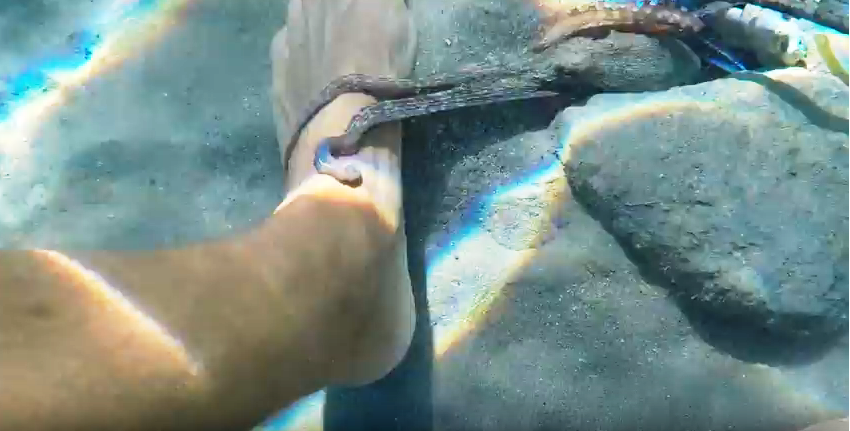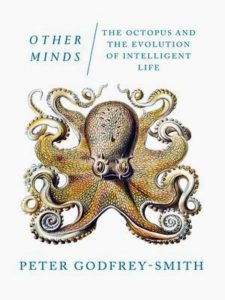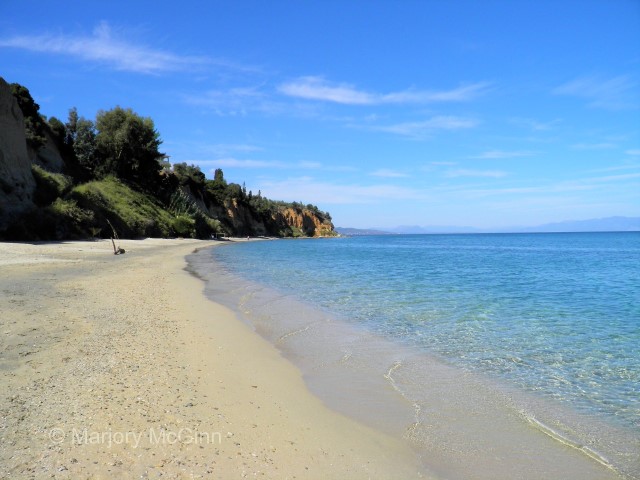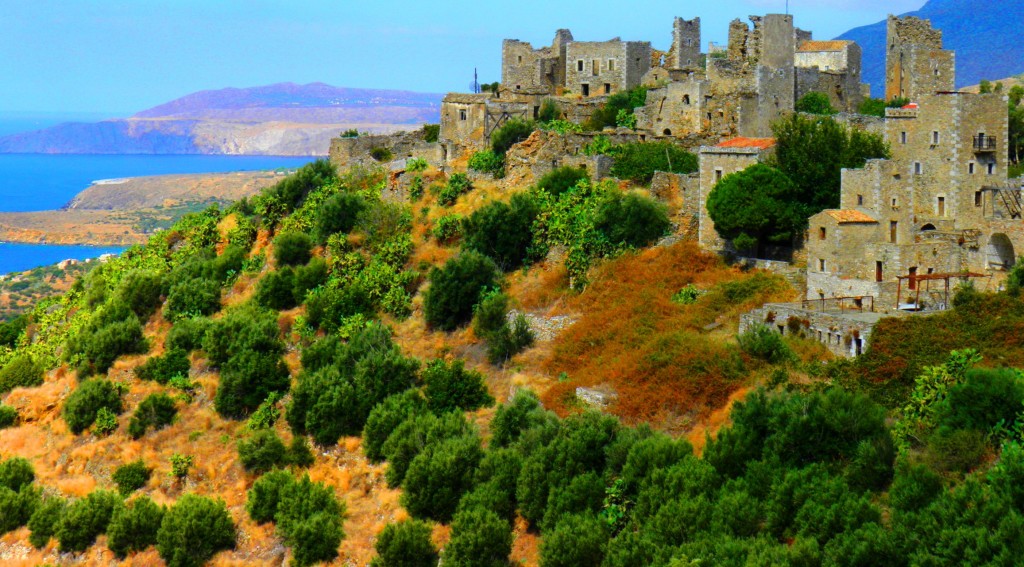I’VE been going to Greece all my life and I had never seen a live octopus in the sea, or come close to seeing one, though I’ve snorkelled a lot in all the right places. But when Jim and I were on the beach late last summer in Koroni (southern Peloponnese), our attention was caught by a German family in the water, and one of the kids shouting the word ‘Octopus!’
Jim and I looked at each other as we splashed about in the warm clear water. We thought it must be a childish wind-up, but the father dived in with a snorkel mask on and after a while the whole family were in a circle, the kids getting fizzy with excitement. It was pretty infectious, so we swam over to have a look and luckily we were wearing swimming goggles. The German guy was friendly and pointed out a flat stone on the sandy bottom in about five feet of water where the octopus had apparently built a lair. It wasn’t much to look at, though it did have a curious arrangement of smaller stones across a gap under the stone and a bent stick wedged across it like a barrier. Where was the octopus? we asked the guy, who it turns out had a nearby holiday home and was familiar with the beach, having swum there for years, and was familiar with octopuses, it seemed.
“It’s hiding under the rock. Give it a moment. It will come out,” he said, putting his foot on the sand right next to the entrance to the lair. By now the kids had skittered off, rather bored, and it was just us three, flattened out in the water in a magic circle, staring at the octopus lair, willing it to come out. After a while there was movement – the tip of a tentacle groped its way out, then more of it, until it was tickling one side of the guy’s ankle. Then another tentacle appeared and finally out popped the whole octopus. It was medium sized and dark brown. The guy seemed pretty relaxed about things, even when two tentacles fastened themselves round each side of his ankle in a strange hug.
“He’s pulling me,” the man said excitedly. “He’s really strong. He’s trying to pull me towards his house.”
He wasn’t kidding. We could see the octopus’s tentacles drawing tight, the suckers gripping and his body edged backwards. Was he just playing with the man, or did he fancy having him for lunch? After a bit, the man’s foot was pulled closer to the lair, the creature backing into the opening and then the octopus finally gave up when task became (comically) insurmountable. We felt incredibly privileged, however, to have witnessed this strange encounter.
Back on the beach we chatted to the German guy for a while about octopuses. He was a keen explorer of this local coastline and an underwater amateur photographer as well. This wasn’t his first experienced of being hugged by this octopus. He had already taken footage of a previous episode. He gave us the video link, which we watched when we got back to our holiday apartment. It was outstanding and almost identical to what we had seen that day. (To watch it, click the link below.)
We went back to the beach the next day, hoping to see the holidaymaker again and watch another man/octopus interface, but as fate would have it, he never reappeared and must have returned home. His parting gift to us, however, had been the amazing introduction to this curious little creature we named Oscar. And we were left wondering how we could lure him out of his house and experience the hug for ourselves. Obsessions can grow on long indolent holidays when the imagination is given a long rein.
With the October weather in southern Greece being exceptionally good, we went back for the next few days to replicate the German’s stance next to Oscar’s lair. Jim would stand with his foot next to it to entice Oscar out. While I was desperate to do the same, I was too short to keep my foot steady on the sea bottom without drowning! Even for Jim, it proved harder than we thought because the currents were slightly stronger than previously and it was difficult to hold the foot in one place for very long, so I had to add extra weight to his efforts by leaning on his shoulders. I imagine we looked like a funny pair to other holidaymakers, though there are never more than a few bathers on the beach in this slightly remote spot.
We tried this out for a few days, hoping to entice Oscar out of his lair, but he was having none of it. We guessed that after a few weeks of interaction with the German, Oscar had got to know him, as strange as that sounds, whereas we were only on nodding, not hugging, terms yet. We could see him curled up inside the lair, often one eye visible, guarding his turf, but nothing else was stirring.
“One day we’ll get hugged,” said Jim. “You wait and see!”
To be honest, we had never really thought much about octopuses until we read a feature, ironically, just before our Greek holiday. It was about a fascinating new book called Other Minds: The Octopus and the Evolution of Intelligent Life (HarperCollins) by Peter Godfrey-Smith, full of anecdotes that shed light on this amazing creature that has the intelligence roughly of a dog or a three-year-old child ‒ and the mischief to match.
The octopus is a cephalopod related to squid and cuttlefish that developed from a snail-like creature about 290 million years ago. It compensated for losing its shell by developing a large brain. The octopus is capable of playing, recognising different humans, as well as other octopuses; it can ‘see’ through its skin and change its shape and colour according to its moods. The Nobel Prize-winning biologist Sydney Brenner once said that the octopus was the “first intelligent being on earth”. And Godfrey-Smith shows that they’re still one of the smartest, but with their eight legs, three hearts and blue/green blood, he also describes them as the “closest we will come to meeting an intelligent alien”.
Octopuses inspired the imagination of mankind long before we understood much about them. The ancient Greek philosopher Aristotle wrote about them and they were admired also by the Byzantine Greeks, who feature them in many of their church frescos, especially the Ainoi (The Praises), with Christ encircled by the sun and moon, the zodiac and various creatures from elephants to scorpions – and octopuses.
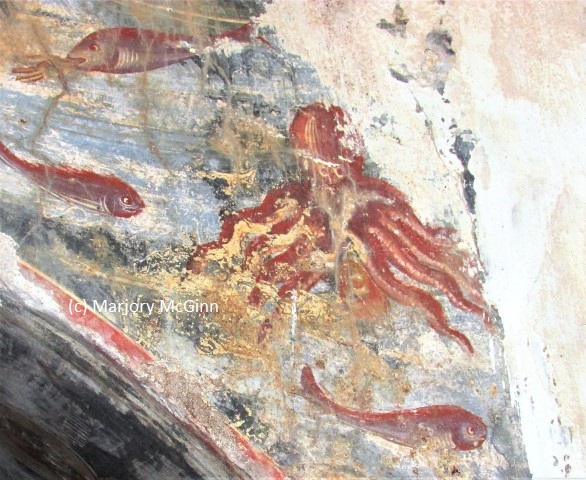
A section of Byzantine fresco showing an octopus from the monastery at Homatero, Messinian peninsula
Octopuses are not only smart, however, they are also adept at interacting with humans and manipulating the environment to suit themselves. Godfrey-Smith refers to one study at the University of Otago in New Zealand, where octopuses were kept in tanks in a laboratory. It was found they could turn off the lights (they don’t like bright light) by squirting jets of water at the light bulbs when no one was watching, short-circuiting the power supply. Or they could squirt water at lab assistants they didn’t particularly like. In another international experiment, where the octopuses were routinely fed on shrimp instead of crab (which they much prefer), one octopus rebelled and would shove his shrimp into the outflow pipe as the lab assistant passed by his tank towards the exit, as a gesture of disapproval.
Godfrey-Smith, a philosopher of science and keen scuba diver, has done much of his own investigation of octopus behaviour, particularly off the east coast of Australia, where there are large colonies of octopus. He has had many similar encounters to our German acquaintance.
“If you sit in front of their den and reach out a hand, they’ll often send out an arm or two, first to explore you, and then – absurdly – to try to haul you into their lair. Often no doubt, this is an overambitious attempt to turn you into lunch. But it’s been shown that octopuses are also interested in objects that they pretty clearly know they can’t eat,” he wrote.
He also reports that a fellow diver, Matthew Lawrence, had another curious encounter with an octopus while diving off the Australian coast. The octopus grabbed Lawrence’s hand and “walked off with him in tow. Matt followed, as if he were being led across the sea floor by a very small eight-legged child”.
After about six consecutive days on the beach on Oscar patrol, during which there had been mostly cloudy, windy weather with poor water visibility, the weather cleared suddenly and became hotter and calmer again and we were able to check out Oscar’s lair properly ‒ and found him still inside. Maybe it was a case of finally putting a name to a foot, but Oscar seemed more responsive this time to Jim planting his foot by the lair. With our heads just in the water, watching through our goggles, we were finally rewarded with the sight of one tentacle emerging, groping its way to Jim’s ankle and attaching itself, and then another tentacle round the other side. Then, as we’d seen before, Oscar moved completely out of his lair and stood beside Jim’s foot, the two tentacles straining, the others locked into position behind him.
“He’s pulling my foot. My God, it feels weird! He’s really strong,” said Jim, with an edge of hysteria in his voice. “I hope he doesn’t pull me into the den!”
“Nah, you wouldn’t fit!” I snipped, because I had octopus-hug envy really bad by then. Why couldn’t it be me too, I thought? It would have been right up there with swimming with dolphins or snorkelling with whales.
After a while, Oscar, bored probably with trying to lug a goliath into his house, slithered back inside, watching us all the while with his dark, shrewd eyes. Maybe he only offered the hug to shut us up; get us off his back finally, but though we returned a few days more and swam around his lair, he never emerged again. Game over!
One night, not long after the Oscar hug, we were having dinner with a Greek couple we had met in Koroni a few years earlier. Tasos is a genial guy who likes a good wind-up and having been a fisherman early on in life, he was very interested in our octopus story.
“You were lucky to find one. They are quite rare in these parts now. The eggs get eaten by some African fish that’s breeding now in these waters. If you tell any other Greeks where you saw the octopus exactly, they’ll go out and catch him, so don’t say a word. Okay?” We nodded, horrified.
“But you can tell me,” he said with a wink. “Just out of interest.”
Ho, ho! “No way!” I told him.
But that got me thinking. Before our encounter, barbecued octopus was one of my favourite meals in Greece, as it is for most people ‒ but not any more. I haven’t, and won’t, eat octopus again. They live for just a few years, are too smart and too rare in places, too cute all round to devour. Most of all, I’ll never be able to forget the sight of small Oscar giving Jim that shy, watery hug. It’s something we won’t ever experience again. Unless … he’s still there this summer when we go back to Greece!
- For more information about Marjory’s three travel memoirs about living in Greece during the crisis, go to the books page on the website www.bigfatgreekodyssey.com/greek-books www.bigfatgreekodyssey.com or the book page on Facebook http://www.facebook.com/ThingsCanOnlyGetFeta
New Book
Marjory has just published a new book, a novel, set in southern Greece, called A Saint For The Summer. This is a contemporary tale but with a narrative thread back to the Second World War, a “tale of heroism, faith and love” described by a recent reviewer as “entertaining, enthralling”. For more information, see the books page link, above.
The book is available on all Amazon sites.
If you have liked any of the books please think of adding a small review on Amazon sites which is always very welcome. And comments on the blog are also very welcome. Thanks for calling by.
© All rights reserved. All text and photographs copyright of the authors 2010-2018. No content/text or photographs may be copied from the blog without the prior written permission of the authors. This applies to all posts on the blog.
